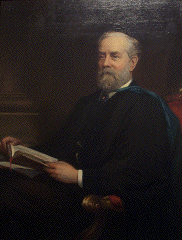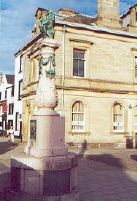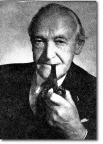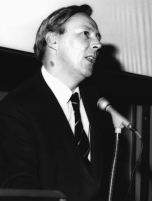Thomas Spencer Baynes, Chair of Logic and Metaphysics 1864-87
The Chair of Logic and Metaphysics was held from 1864-87 by Thomas
Spencer Baynes. His father was the famous Baptist preacher Joseph
Baynes from Somerset. Thomas Spencer Baynes himself was remembered
as William Hamilton's best logic pupil at the University of Edinburgh.
On graduation, he went to London to pursue a career as a journalist
and as Assistant Editor of the Daily News. But his health suffered
from the stress of overwork (he was described as having "a
weak heart and only half a lung"). It was recommended that
he take a less demanding position, and was accordingly elected
to the Chair of Logic, Rhetoric and Metaphysics at St Andrews.
Until the founding of the Berry Chair of English in 1896, it
fell to the Professor of Rhetoric to lecture on literature, and
Baynes made a study of Shakespeare's Midland dialect (having
already published a study of his own Somerset dialect). Baynes
did not relax, in 1873 taking on the editorship of the Ninth
Edition of Encyclopedia
Britannica. He died suddenly shortly before publication in
1887, and the edition is still remembered as one of the most
important.
The portrait opposite was painted in 1888 by Lowes Cato Dickinson, a highly successful Victorian painter from London. It was presented t Mrs Baynes in 1888 by pupils and friends. In September 1990 a vandal left a 75 cm long curving scratch across the bottom of this painting. It was subsequently repaired and cleaned and featured in an exhibition of restored local paintings in March 2002 the Crawford Arts Centre in St. Andrews.

Portrait of Baynes in the University's collection.
It normally hangs in the Senate Room.







